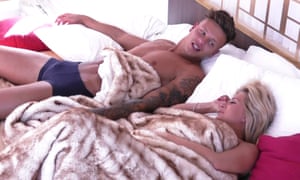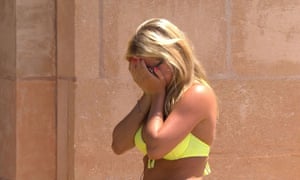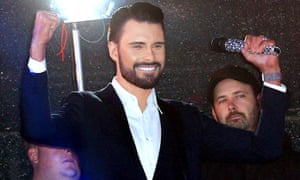'I was heartbroken': former Miss Great Britain Zara Holland and others on their summer of reality TV
Love Island was this year’s X-rated hit, but it cost Miss Great Britain her crown. Has the reality genre jumped the shark?
Iwatched 16 hours of television last week: one season and a half of UnREAL, an American drama series about a reality TV show called Everlasting. It is a fictional version of The Bachelor, in which women compete to marry a man with giant teeth; it was written by a former Bachelor producer.
They do this for prize money, or attention, or the ability to start a brand beyond the show, because reality can make people rich; you can prostitute your personality disorder, monetise your tragedy. The producers of UnREAL do what you suspect their real counterparts do: they destroy people for ratings. Sadism is not new, but that they do this with their victims’ complicity is fascinating.Reality TV is a machine now.
A few scenes from UnREAL: the producers secretly film a woman having sex with the suitor (they call him a “meat puppet”), and send in her father to declare his shame. (Reality is all misogyny. It is a conservative genre.) They invite an abusive ex-husband on to speak to his wife, who later kills herself by jumping off a roof. (The producers had swapped her medication for a placebo; on meds she was dull, but alive.) They lock an abused woman, brought up in care, in a room, then employ an actress to pretend she is her mother, so the “meat puppet” will reject her for dishonesty, live on television. None of the victims will be believed because, here, TV is God. People are flattened by their own emerging narratives.
I had nightmares about UnREAL. I dreamed I was broken down into constituent parts; I woke up crying, fairly sure I had PTSD, and almost got as far as telephoning a psychotherapist before I wondered – have I become my reality TV character? Is that her – the screamer?
I could have found out because, in 2007, I came close to getting into Big Brother. It was for an article, and I am relieved about that because, had I not been outed as an undercover journalist, I might have done it. The producers have the gift of making you feel fascinating; and it is hardly hard work, exhuming your dominant personality traits. My semi-successful pitch was to be aggressive; they were very interested in my sex life. The Big Brother psychotherapist asked me about my orgasms and suggested I was a masochist; then he told me not to do it.
That was almost 10 years ago. Since then, the genre has swelled. There are talent contests: X Factor, The Apprentice. There are makeover shows, from houses to tits (Location, Location, Location, The Swan). There is damaging fake social commentary (Benefits Street) and fake social experiment (Big Brother, I’m A Celebrity…, Love Island). There is fake social work (The Jeremy Kyle Show) and scripted reality (The Only Way Is Essex, Made In Chelsea, Geordie Shore). I suppose viewers felt they got some power back when they were able to makeEdwina Currie eat something on I’m A Celebrity. Reality TV is not all bad (Flockstars was about sheep, and they are harmless), but most of it is.
This summer, I watched Love Island on ITV2. It is a gameshow in which couples pair off, and the most popular couple win £50,000 by public vote. It is a huge hit, as if we would rather think about sex than Brexit, which is understandable. The men and women are so handsome, they could be another species living in a sex villa, although I wonder if the boys inject steroids. Their arms are huge. Their heads are small. They loiter, speaking a language I barely understand. They mate; the men choose, of course, although the women can indicate a preference by stepping forward. We watch them have sex under duvets in the sort of half-light Channel 4 News uses for footage of war crimes. It feels semi-innocent, but maybe that is the jadedness of 20 years of reality; at least it is normal sex. The most popular couple win after a public vote. They have to be attractive but relatable; you have to believe in their fights. New boys and girls are fed into the house, for drama and betrayal. A quiz repeats the cruel things they say about each other “in private”, and they have to guess who said what. This is medium-grade sadism – nothing serious, no deaths.
A man went on a date with a new girl while his current partner was locked up in another room, painting a mask on her face and crawling on the floor. What else is there to do on a show whose tagline is “Survival of the fittest” but curate your skin? He went on a spa date, the current partner wept and shouted, so he dumped her for the inappropriate emotion the producers had incited.
Love Island is fiercely self-policed. Girls tut and slag each other off. The back channels on this show would shame Swiss diplomats. They put up with rubbish from the men, whom they treat like honoured idiots. They are subservient and soothing towards them, and that did teach me something about life, I suppose, because I don’t know any women like that.
It was in Love Island this year that Miss Great Britain was de-crowned; that was its big tabloid bump, the story on the front pages, the defenestration of a beauty queen. She is, now, to me, an actual person with an expression: Zara Holland, a small, anxious blonde in the empty ballroom of a hotel near Hull, sitting with her mother, Cheryl, who was also a beauty queen. She is eating toast, veering between fury and shame.
Holland loved being Miss Great Britain, and took it very seriously; she complains she had to pursue invitations to charity events herself, to promote the brand. When she won last autumn, she asked her mother, “Am I really Miss Great Britain? Because at school I could never really achieve and I never really believed in myself. I was so proud to hold that title.”
Holland went on Love Island to meet a man. At first, I don’t believe her – who would do that? – but she says she really did. And why not: it is only a small leap from internet dating. When Holland talks about men, she sounds evasive: “I’ve been on dates, but I’m a busy girl and sometimes you just don’t click with a certain someone.”
It was the end of week two; her first “boyfriend” – Scott, a man with a tiny head – had left her and she was in a sexless couple, fretting. Two new boys had to vote on the fittest girl: “I got really rubbish results.” Holland was fourth fittest girl, out of five. (This is a reality TV staple; I was least fit girl at my Big Brother audition. It stings if you care, which I didn’t.) When Scott dumped her, “I felt a bit annoyed. Bloody hell, everyone else is coupled up.” Holland isn’t languid, you see, not Love Island sexy. She’s nervous, a grafter. She was the best friend, the confidante; on an island of writhing duvets and poised, imperturbable women, she was an object of pity. Then she cracked.
“I think she felt left out,” her mother says. “I did,” Holland agrees. “Everyone else was very much a couple; they had sex in the communal bedroom. I had to sit there and watch.” She put in earplugs.
Then she got a text, telling her to take one of the new boys to the “hideaway”: “#newboy #freshmeat”. She chose Alex, a scaffolder from Birmingham: “He seemed very nice, very genuine.” They had sex in the hideaway under a duvet, on one mojito and half a bottle of champagne. One shot showed Holland licking her teeth in triumph. She looked voluptuous, unworried, herself. She had made a point; she was wanted.
“I know I can’t mix my drinks,” she moans. “I’m such a lightweight.”
It is painful to listen to the testimony of her shame, which sounds designed to be announced in public, as if the words are not her own: “I let my family down. I let my mum down. I broke my promise.” They both say, solemnly: “It was very out of character.”
Then the Miss Great Britain organisation told the producers she was to be de-crowned. It was a made-up piece of righteous anger; everyone else was having sex, except a man called Adam. And, Holland says, the Miss Great Britain organisation had agreed to her participation; was it a set-up? The producers told Holland, who sobbed in tanned female arms (even arms can look duplicitous in the right shade of orange). She could have stayed, but left the show on the pretext that her mother was ill.
“The producers told me off camera,” Holland says. “They read out an official statement that had been posted on Twitter.” It said, euphemistically: “Following recent actions within the ITV2 show Love Island, it is with deep regret that we, the Miss Great Britain Organisation, have to announce that Zara Holland has formally been de-crowned... The feedback we have received from pageant insiders and members of the general public is such that we cannot promote Zara as a positive role model.”
“Everybody had read this before me,” Holland tells me. “I was the last person to know. I couldn’t have an opinion, I couldn’t say my say. Nothing. That’s what hurt. That was awful. They couldn’t even pick up the phone to tell me.
“It’s really opened my eyes,” she says. “I feel… I’m just heartbroken, because the Miss Great Britain title meant the world to me.”
I am curious about Alex. After it happened, he seemed to treat the sex as an ordeal Holland had subjected him to, which could be cured only by sneering at her among a group of other men; if there is kindness in Alex, Love Island did not show it. “Alex did come over and say, ‘I’m sorry,’ which was quite nice, because no one told him to,” Holland says. I fantasise that he was fired from his scaffolding job, also on Twitter; I know he wasn’t.
“Why does the man get the slap on the back and the thumbs up and good lad, and the woman is disgraced?” Holland’s mother asks. I suggest we all boycott the Miss Great Britain competition, even though I was boycotting it anyway.
“There has been no mention of Alex,” Holland says crossly. “There was nothing. It was all me. It was all ‘the girl’.”
Does she want the title back? (She has spent a lot of time talking about auctioning her crown for charity, although I beg her not to; I want her to wear it when she is an old woman.) “No. The heartache and the heartbreak and everything I’ve gone through: how you put it right, I don’t know. It’s amazing how in a few seconds your whole life can change.”
Still, she isn’t entirely through with reality TV. “If the right show came along, who knows?”
Marco Pierre White Jr is familiar with chaos. His father is the famous restaurateur; his mother, Mati Conejero, who is separated from his father, wasrecently charged with assaulting her son, but acquitted when he didn’t turn up to testify against her. The Whites would be a famous, and desolate, reality show.
White Jr was voted off the current Big Brother after a week, during which he hadsex with actor Laura Carter. It was difficult to find him; initially, his publicist didn’t know where he was. Then he telephones me. He sounds fuzzy, indistinct. He is, for now, tabloid famous, Pete Doherty’s heir.
I ask why he went on Big Brother. “I thought it would be a great experience to meet new people,” he says. Then: “I don’t know why. Honestly. I thought it would help me with my drug addiction, and it did. I got sober for 10 days. And I have started getting sober again recently, the last couple of days. So I did it for myself, more than anyone else.” He says this with a flourish; I imagine him bowing to the crowd. This is how drug addicts speak.
How did it keep him sober, I ask stupidly. “You can’t get any drugs inside there, can you?” he says. “I thought, if I go in there and I do win, or I go on, then there’s five weeks under my belt – five weeks sober, that’s a great start. It’s always the beginning that’s hard if you’re trying to get sober. But I did come out and go on a complete bender.”
He asks me to hang on for a bit. He is gone for 90 seconds. He comes back. “It was amazing,” he says. “A lot of people forget you’re being filmed all the time. I never forgot.” But he was happy to leave: “They don’t really give you enough alcohol in the Big Brother house. They just drip-feed you, so you never actually get drunk. You only get tipsy. They show it like you’re drunk, but you’re never drunk.”
When he left, they showed him his press clippings, like an end-of-term report. His strategy had been effective: he was glued, blurrily, to the tabloids. “It was mind-blowing. But I’m much happier since I came out. Bit more crazy now.”
He makes no sense, as you can hear, but he craves more reality: “You just get hooked on it. It’s crazy, being able to go away, be you and not having to care what people have to say to you. In Big Brother, you don’t get the outside world’s opinion until you get out.”
White lives his life, day to day, in the tabloids. I can barely keep up; as I write, a former housemate isinterpreting a Snapchat rant as a death threat. He broke up with his girlfriend Kim live on ITV the day we speak, during an interview with Holly Willoughby. He has a new girlfriend; he speaks of her in homily, so she doesn’t sound real: “I’ve met this new little one, haven’t I – Holly – the last couple of days, haven’t I, started seeing someone? She’s an amazing girl, she’s got a heart of gold, bless her.”
I ask about the sex in the house, mostly because Holland racked herself with it after Love Island. “One thing led to another,” he says. “We’re just friends. I don’t know if we’re friends, even. We’re just friends in the Big Brother house. I don’t know.” Does he feel any shame? “None whatsoever.”
***
Rylan Clark-Neal became famous when he cried on the X Factor in 2012; he is, for now, one of Britain’s most successful reality stars. When he learned he had made it into the X Factor’s live shows, largely due to his extraordinary costumery (“I had the long, blond, fake hair teamed with a pair of fully crystallised Converse hi-tops”), he crawled on the floor, sobbing, and wiped his nose on a cushion. Either it was fake, or it was, for him, recognition that he was wanted at last. It was a very successful audition for a TV career, and he went on to win Celebrity Big Brother in 2013. He is, I learn from his new memoir The Life Of Rylan, very handsome, superficially jovial and insecure. “I hated what I could see in the mirror,” he writes, so he is always dressing up. He has been obsessed with reality TV since he was 11. “That concept of spying, and a world within a world. Seeing people when they are not acting (even though they know they are being filmed). That buzz.”
Clark-Neal now presents Big Brother’s Bit On The Side and defends the genre. “You have been introduced to communities and religions and backgrounds you would never experience in real life,” he says. He mentions Nadia Almada, the first transgender woman to win Big Brother, in 2004. Before Nadia, he says, people didn’t know that “a transgender woman from Portugal would actually look like a woman”. He also mentions Jade Goody, who didn’t know that she was valuable before Big Brother: “God bless her soul. She didn’t know what she could do.” Clark-Neal’s argument is, essentially, Withnail’s scream to I: the only programme reality stars would normally get on is the fucking news.
“Cruelty,” he says, “is what people want.” He thinks reality viewers are “quite sick like that. You watch something like Love Island, and the premise is for people to couple up and get in a relationship. What the viewers really want is to see people cheat on each other, have arguments, have sex.” If you don’t like it, his remedy is unanswerable: “Don’t watch it.” Reality, he says, “gave me a life I have always wanted. I was the X Factor reject. My job was to be the one that everyone spoke about. I did my job well and I went straight into Celebrity Big Brother, then I could drop the act. I knew exactly what I was doing.” But he still can’t go to the shops by himself: he is too anxious.
Clark-Neal believes that reality TV “has changed the scope of actual real life”, and I am sure this is true. Reality vomited up Katie Hopkins, the national newspaper columnist whose Manichean world would make great TV. It may even vomit up a president: would Donald Trump, whose presidency would be the ultimate TV, be a contender without The Apprentice? This is the final triumph of TV over reality, over civilisation, as screenwriter Paddy Chayefsky foretold in Network 40 years ago: a great wave of desensitising, of disassociation, of lust for drama, of real people being defective without an edit. I want to see the potential in reality, but Nadia Almada cannot absolve a whole genre by herself. It’s wretched trying to make life impersonate art, but it is cheaper than actors.
https://www.theguardian.com/tv-and-radio/2016/jul/29/reality-tv-love-island-zara-holland-miss-great-britain






Nenhum comentário:
Postar um comentário